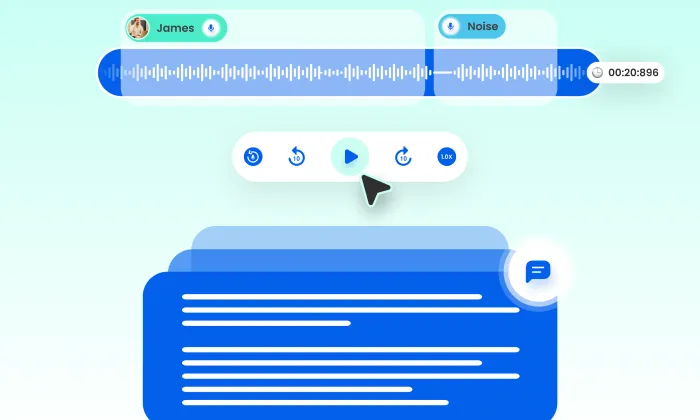Are speaker roles explicitly labeled (Doctor/Patient)?
Role Labeling
Healthcare
Speech AI
In the realm of healthcare AI, the explicit labeling of speaker roles such as "Doctor" and "Patient" is crucial for developing effective and nuanced models. This precise tagging forms the backbone of AI systems that aim to understand and replicate doctor-patient interactions accurately.
Defining Speaker Role Labeling in Datasets
- What Is Speaker Role Labeling: Speaker role labeling assigns distinct tags to each participant in a conversation, indicating their roles. In datasets like the Doctor-Patient Conversation Speech Dataset, this tagging is essential for differentiating between the voices of doctors and patients during dialogues. It ensures that AI systems can correctly interpret the context and dynamics of healthcare conversations.
Importance of Explicit Speaker Role Labeling
Why Does It Matter?
The clear tagging of speaker roles significantly enhances the capability of AI models in several ways:
- Improved Contextual Understanding: Identifying who is speaking enables models to grasp the nuances of doctor-patient dialogues. For instance, understanding whether a question comes from a patient or a professional allows AI to generate more contextually relevant responses.
- Enhanced Data Usability: Labeled data provides essential context, allowing AI to associate language patterns with specific speaker roles. This improves model training efficiency and performance in real-world applications, such as conversational AI and speech recognition.
- Effective Model Evaluation: Clearly defined roles help in evaluating model performance, making it easier to identify and address areas needing improvement by analyzing specific interaction types.
Process of Speaker Role Labeling
In datasets like those developed by FutureBeeAI, the process involves:
- Recording Conversations: Conversations are recorded in settings that mimic real-world clinical environments, capturing both telephonic and in-person interactions.
- Transcription and Annotation: Each conversation is transcribed verbatim, with utterances labeled by speaker role. This step is crucial for maintaining clarity and context.
- Quality Assurance: The data undergoes thorough quality checks, including linguistic accuracy and medical expert validation, ensuring the annotations are accurate and contextually appropriate.
Challenges in Speaker Role Labeling
While the benefits are clear, speaker role labeling presents certain challenges:
- Resource Intensity: Accurate labeling demands significant resources and time, necessitating a balance between detail and efficiency.
- Complex Scenarios: Conversations may involve more than just doctors and patients, complicating the labeling process. A flexible annotation strategy is vital to manage such complexity.
- Bias Considerations: Ensuring diverse interactions in the dataset prevents biases that could affect model generalization across different populations and healthcare contexts.
FutureBeeAI's Approach
At FutureBeeAI, we ensure that our Doctor-Patient Conversation Speech Dataset includes precisely labeled speaker roles, enhancing the dataset's quality and usability. By simulating realistic clinical interactions while adhering to ethical standards, we provide a robust foundation for developing and refining healthcare AI systems.
For AI engineers and researchers, leveraging a dataset with explicitly labeled roles means improved model accuracy and reliability, paving the way for advanced conversational AI applications in healthcare.
Smart FAQs
Q. How does FutureBeeAI ensure the accuracy of speaker role labeling?
A. We implement a meticulous quality assurance process involving both automated checks and medical expert reviews to ensure that speaker roles are accurately labeled and contextually appropriate.
Q. Why is speaker role labeling particularly important for healthcare AI?
A. Speaker role labeling allows AI systems to accurately interpret the distinct dynamics of doctor-patient interactions, improving tasks like speech recognition and conversational AI applications, ultimately enhancing patient care and communication.
What Else Do People Ask?
Related AI Articles
Browse Matching Datasets
Acquiring high-quality AI datasets has never been easier!!!
Get in touch with our AI data expert now!








